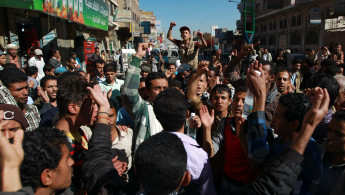Yemen university becomes focus of anti-Houthi protests
The area became symbolic after becoming the focal point of demonstrations in 2011 against the former president, Ali Abdullah Saleh, and also the site of a sit-in known as "Change Square".
And much has changed since then.
The tent city set up in 2011 by revolutionaries - including the Houthis - remained for more than three years. But now the Houthis have returned as the regime, and Houthi gunmen surround the university area just as Saleh's forces did four years ago.
The new protests are a manifestation of popular discontent against the group, which began seizing control of the state in September 2014 in what Houthi leaders said was a popular revolt against corruption.
However, opponents say the movement has taken over the state by force.
The majority of the activists today were there in 2011. Members and supporters of the Joint Meeting of Parties (JMP) came out on the streets while the leaders of their parties continued negotiations with the Houthis.
| Yemen's quiet secession. Read more. |
Civilian anti-Houthi activities are expanding and have become more organised, leading to the creation of groups such as Rafd ["Rejection"], which began in Ibb governorate, before spreading to Sanaa, Taiz and Hodeidah.
Then there is the group calling itself "We Shall Not Sit Idly By", launched by novelist Mahmoud Yassin. Its activists go to homes and prisons besieged by Houthis, to protest peacefully and demand the release of prisoners.
Ibb Musa al-Aizaqi, the founder of Rafd, told al-Araby al-Jadeed that his group had gathered more than two million signatures in a petition against the Houthis' takeovers.
He said he believed that Rafd had broken through the Houthi-inspired "fear barrier" - and that recent peaceful protests had revived the spirit of 2011.
Rejecting the 'coup'
The pace of protests has escalated noticeably since Abed Rabbo Mansour Hadi quit as president in January, saying he could not longer be held responsible for the country.
The protests denounce the Houthi "coup", with slogans including: "Revolution against the coup. Houthis, you are liars."
 |
|
| Women have been well represented at the protests against the Houthis [AFP] |
No protest appears to demand Hadi's reinstatement.
"We came out in 2011 and we are coming out today," said Hazem Jubran, one of the people participating in Friday protests.
"Yet I feel our protests now express what we want more than before. This time, we did not come out because we were influenced by the Arab Spring... we came out to reject the injustice that the Houthis want to impose."
Crackdown
The Houthis have yet to find any other way to deal with protests than to squash them.
Yahya al-Sawari, a journalist, was grabbed by gunmen during an anti-Houthi march and was held at a hotel for three days. He said he would continue to protest, despite what happened.
"Demonstrations are not a person that they can kill. They are an idea that cannot be killed," he said.
Left-wing protesters affiliated to parties such as the Yemeni Socialist Party and the Yemeni Unionist Nasserite Movement are particularly well represented in the marches.
In one recent protest, the 11 people arrested were all left-wing activists - which was not the case in 2011, when many detained protesters were affiliated to the Islamist al-Islah Party.
Abdullah al-Bahlouli, an activist, said he would also march against the growing repression of free speech in Yemen:
"Four years ago there would be one event a year in solidarity with kidnapped journalists. A year ago, we were participating in monthly solidarity events with kidnapped journalists. Now, we are doing so for five or six kidnapped journalists each day."
The Houthis have avoided commenting on reports about their actions against protesters. More than one figure contacted by al-Araby declined to comment.
Activists arrested by the Houthis say they were told they were being held to "protect them" from attacks planned by "terrorists".
Political observer Abdullah Dawbala said he believed the protests had been somewhat effective. However, he added, their greatest value would be giving an outlet to the anger of young people against the political collapse of the country.
Dawbala said if the Houthis repressed the protests, they would lose their popularity and drive the youth to violence.
This is an edited translation from our Arabic website.


![President Pezeshkian has denounced Israel's attacks on Lebanon [Getty]](/sites/default/files/styles/image_684x385/public/2173482924.jpeg?h=a5f2f23a&itok=q3evVtko)



 Follow the Middle East's top stories in English at The New Arab on Google News
Follow the Middle East's top stories in English at The New Arab on Google News


